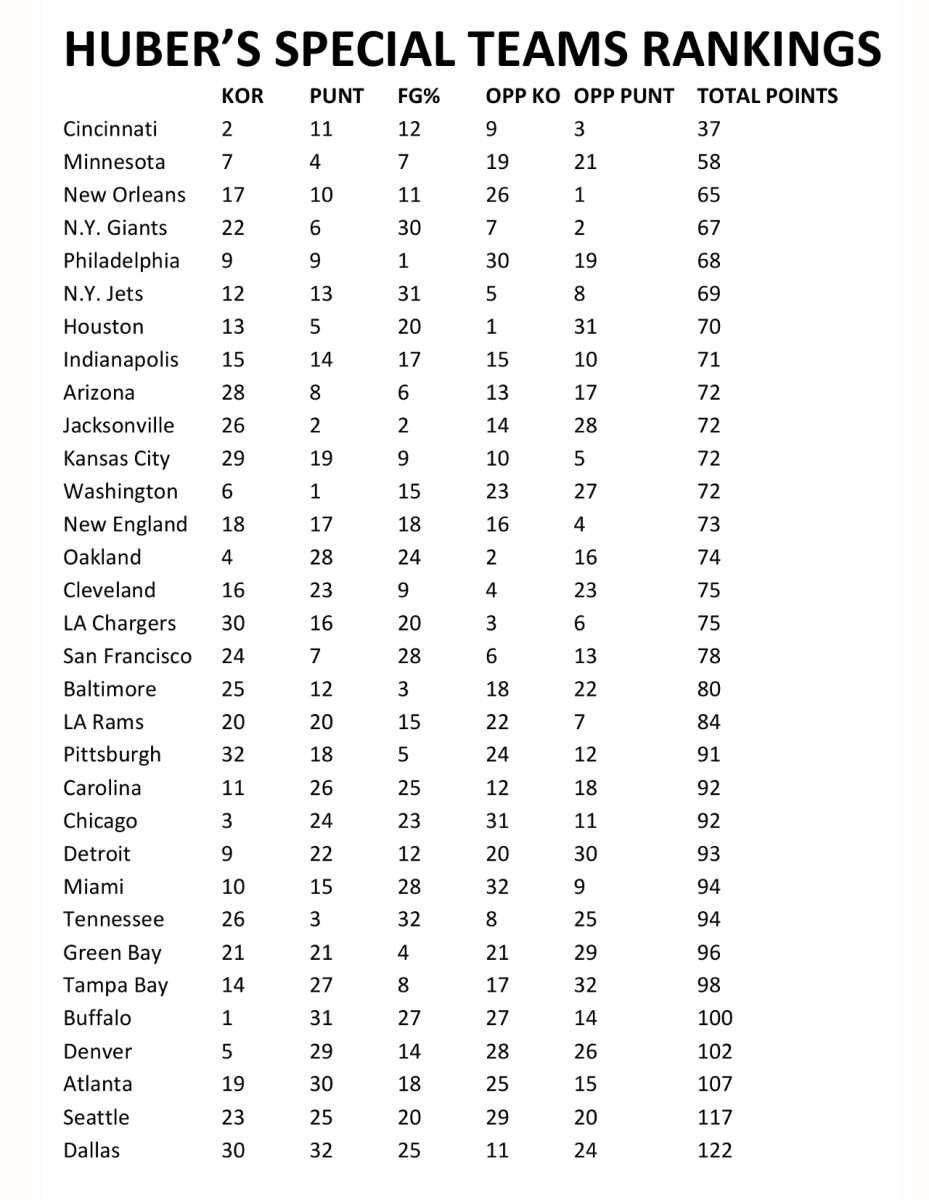World’s Best Preview: The Packers’ Sinking Special Teams

The only thing saving the Green Bay Packers from a total special-teams disaster has been kicker Mason Crosby.
With slumping punter JK Scott and a punt-return unit that has been stuck between neutral and reverse all season, the Packers under first-year coordinator Shawn Mennenga have plunged to No. 26 in our special-teams rankings entering Sunday’s game against the New York Giants.
Field position is the name of the game in our five-category rankings.
“We want to try to be the top of the league in all those statistical categories,” Mennenga said on Friday.
Instead, the Packers are 21st or worse in four of the five categories.
The first column in the chart below is starting field position following a kickoff return. Tremon Smith has failed to provide the impact he did last year as a rookie with Kansas City. The Packers’ average starting point following an opponent kickoff is the 24.5-yard line, which ranks 21st. While Smith has a 36-yard return, generally speaking, the best play in Mennenga’s playbook has been hoping the opposing kicker boots the ball into the end zone for a touchback.
The second is net punting average. This was a strong point early in the year, when Green Bay was 19th overall in our rankings headed into the Week 8 game at Kansas City. In the first seven games, Scott’s net average was a third-ranked 44.4 yards behind a second-ranked 4.65 seconds of hang time. In the last four games, his hang time is a 25th-ranked 4.25 seconds and his net average is a 32nd-ranked 34.7. That’s almost a first down worth of field position on each punt. Put together, his net of 41.1 net yards per punt has Green Bay ranked 21st in this category.
“I would say anytime you’re out of rhythm, it’s going to affect your confidence a little bit because you don’t have surety of hitting a perfect ball every time,” Scott said this week. “So, definitely, I would say your confidence is affected a little bit, and that’s what I’m trying to build is that confidence and things will let loose.”
The third is field goal percentage. Crosby is 13-of-14 on field goals, a 92.9 percent success rate that has Green Bay fourth in the league.
The fourth is the opponents’ average starting point following a kickoff. A month ago, Green Bay was 27th with an opponent average starting point of the 26.8-yard line. Now, it’s 21st with a starting point of the 25.5. This is an area where there’s been significant improvement. After allowing returns of 60 yards vs. Denver in Week 3 and 67 yards vs. Philadelphia in Week 4, the Packers haven’t allowed a single kickoff return of 40-plus yards the past seven games. In fact, over that span, the Packers have allowed only two kickoff returns of 30-plus yards.
The fifth is the opponents’ net punting average. This is the number that measures the effectiveness of the punt return. Green Bay incredibly has lost 11 yards on punt returns. The Packers, surprisingly, aren’t 32nd in this category. Instead, they’re “only” 29th, due to opponents not punting the ball as far against Green Bay as other teams. Mennenga has played it conservatively, for the most part, electing to use one jammer on the gunners to keep extra men in the box to prevent fakes.
“We’ve had eight punt return opportunities through the season,” Mennenga said.
The lack of a proven punt returner is probably the biggest problem. In 2017, when Trevor Davis ranked third in the league in return average and had perfect ball security, Green Bay ranked fifth in opponent net punting average.
The return games must make coach Matt LaFleur’s head spin. Comparing Green Bay’s punt-return unit (minus-1.4 yards) to its punt-coverage unit (8.1 yards), the difference is 9.5 yards. Comparing Green Bay’s kickoff-return unit (18.9 yards) to its kickoff-coverage unit (26.2 yards), the return difference is 7.3 yards.
“I think our coverage units have improved,” Mennenga said. “Obviously, we haven’t flipped the field on the net punt like we’ve wanted to the last couple games. We’ve kicked the ball well in field goal and field-goal protection and we’ve affected some kicks. The return game hasn’t been what we’ve wanted at all. Obviously, we know our struggles in the punt return game. It’s not where we want to be at all but we’re working hard to improve that. Trying to create some explosive plays, and we’ve not don’t that.”
If there’s a silver lining, the special teams generally have not killed the team other than the block allowed against the Chargers and the muffed punt against Detroit by Darrius Shepherd. However, the kickoff coverage is vastly improved, the ball security has been good aside from Shepherd’s miscue and Crosby keeps putting the ball between the uprights. The Packers were found guilty of 26 special-teams penalties last season, tied for second-most in the league. This year, they’ve been penalized 10 times, tied for 11th-fewest.
Special teams will be important on Sunday against the Giants and going forward. New York is No. 4, Washington is tied for No. 9, and Minnesota is No. 2.
“We’ve improved our penalties, we haven’t done anything to hurt us as far as giving up a touchdown, those kind of things, but we haven’t created plays that we’ve wanted to,” Mennenga said. “We’re striving hard to do that in the return game and flip the field, create some turnovers in the kicking game and try to give our offense a short field.”

